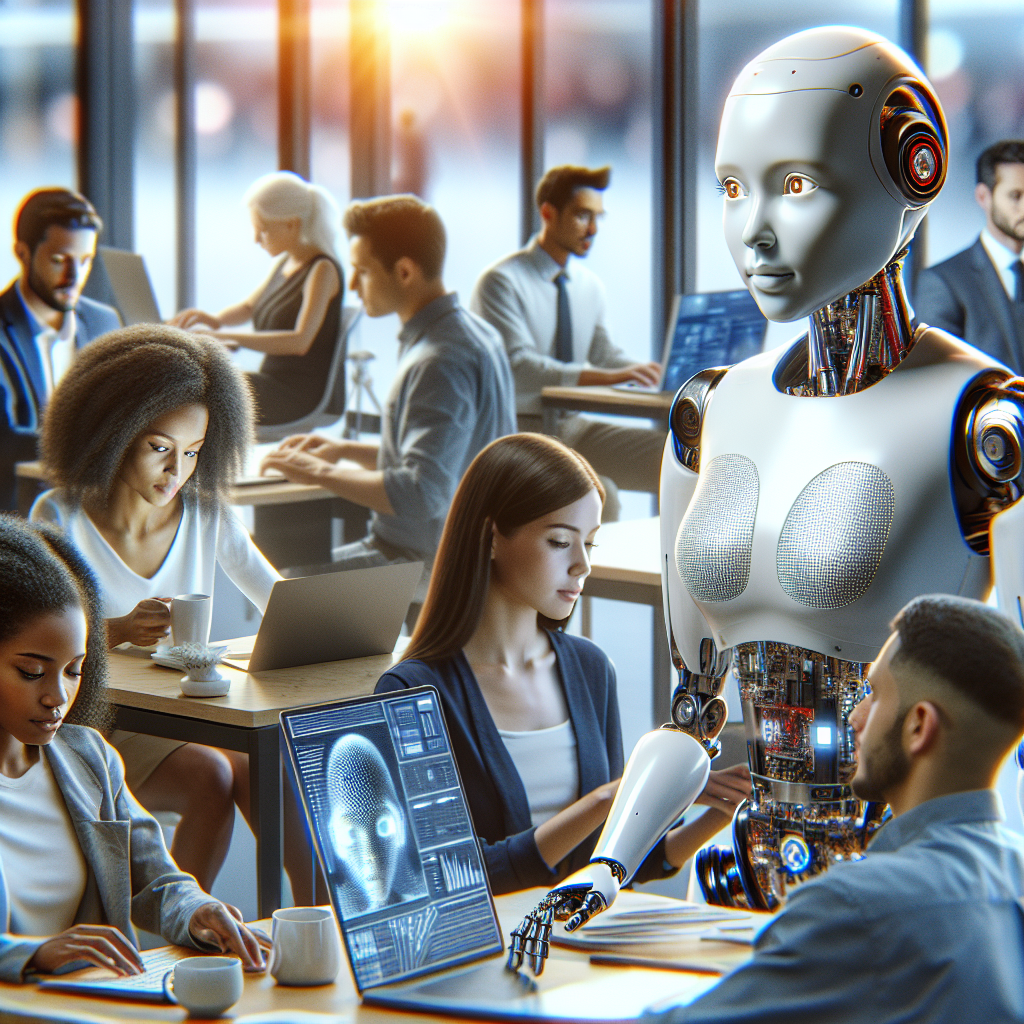
In recent years, the rapid advancement of artificial intelligence (AI) has sparked a heated debate on whether AI will eventually replace humans in various aspects of life. From automating mundane tasks to simulating human-like conversations, AI's capabilities have grown exponentially. This has led to a mix of excitement and concern about what the future holds.
AI is already making significant strides in industries such as healthcare, finance, and customer service. For instance, AI-driven chatbots are being used to improve customer engagement and streamline processes. These developments raise critical questions: Will AI make human jobs obsolete? Can machines truly replicate human creativity and emotional intelligence?
While some experts argue that AI will create new job opportunities and enhance human capabilities, others fear widespread job displacement and social disruption. This essay aims to explore these contrasting viewpoints, delving into the technological advancements, potential job displacement, and the ethical considerations that come with the rise of AI.
If you're intrigued by how AI can transform industries and want to learn how to build powerful AI chatbots yourself, consider taking our Learn AI Chatbot Course. It's designed for marketers and marketing agency owners who want to harness the power of AI.
Technological Advancements in AI

The landscape of artificial intelligence has undergone remarkable transformation in recent years, driven by groundbreaking technological advancements. These developments have made AI more powerful, efficient, and capable of performing tasks that were once thought to be the exclusive domain of humans.
One of the most notable advancements is in the area of machine learning (ML), a subset of AI that enables systems to learn and improve from experience without being explicitly programmed. Through techniques such as neural networks and deep learning, ML algorithms can analyze vast amounts of data to recognize patterns and make predictions with high accuracy. This has led to significant breakthroughs in fields ranging from natural language processing (NLP) to computer vision.
Natural language processing, in particular, has seen tremendous growth. AI models like GPT-3 can generate human-like text, engage in coherent conversations, and even write essays or articles. This advancement has profound implications for industries like journalism, customer service, and content creation. Similarly, computer vision has enabled AI to interpret and understand visual information, leading to innovations in areas such as autonomous vehicles, medical imaging, and facial recognition.
Moreover, the integration of AI with the Internet of Things (IoT) is creating smarter environments. From smart homes that adjust settings based on user preferences to industrial IoT applications that optimize manufacturing processes, the synergy between AI and IoT is revolutionizing the way we interact with technology.
These technological advancements are not just limited to software. Hardware improvements, such as specialized AI chips, are enhancing the processing power and efficiency of AI systems. These chips are designed to handle the complex computations required by modern AI algorithms, making real-time data processing and decision-making more feasible.
While these advancements bring numerous benefits, they also raise critical questions about job displacement, privacy, and ethical considerations, which will be explored in subsequent sections of this essay.
Impact of AI on Employment
The impact of artificial intelligence on employment is a topic of significant debate and concern. As AI technologies continue to evolve, they are increasingly capable of performing tasks that were once the sole purview of human workers, leading to both opportunities and challenges in the job market.
On the one hand, AI has the potential to enhance productivity and efficiency across various industries. Tasks that are repetitive, mundane, or dangerous can be automated, freeing up human workers to focus on more complex and creative endeavors. For instance, in manufacturing, robots powered by AI can assemble products with precision and speed, reducing the risk of human error and workplace injuries. Similarly, in the financial sector, AI algorithms can analyze market trends and make investment decisions faster and more accurately than human analysts.
However, this shift also brings about concerns regarding job displacement. As AI systems become more sophisticated, there is a risk that many traditional jobs will be rendered obsolete. Jobs in sectors such as retail, customer service, and transportation are particularly vulnerable. For example, the rise of self-checkout systems in retail stores and chatbots in customer service has already begun to reduce the need for human workers in these roles.
Moreover, the demand for new skill sets is growing. Workers will need to adapt to the changing landscape by acquiring skills in AI, data analysis, and other technology-related fields. This has led to a greater emphasis on lifelong learning and continuous professional development. Educational institutions and employers are now tasked with preparing the workforce for an AI-driven future, which includes not only technical skills but also soft skills such as critical thinking and adaptability.
While the impact of AI on employment is complex and multifaceted, it is clear that both individuals and organizations must proactively navigate these changes. Balancing the benefits of AI with the need to mitigate its disruptive effects on employment will be crucial in shaping a sustainable and equitable future.
Ethical Considerations of AI

The rapid advancement of artificial intelligence has brought numerous ethical considerations to the forefront. As AI systems become more integrated into our daily lives, it is essential to address the ethical implications to ensure these technologies are developed and used responsibly.
One of the primary ethical concerns is **bias in AI algorithms**. AI systems are trained on large datasets, which can reflect the biases present in the data. If these biases are not addressed, AI systems may perpetuate and even exacerbate existing inequalities. For instance, facial recognition technologies have been criticized for their higher error rates in identifying individuals from minority ethnic groups, raising concerns about discrimination and fairness.
**Privacy and surveillance** are also significant ethical issues. AI technologies, particularly those used in surveillance, have the capability to collect vast amounts of personal data. This raises questions about how this data is stored, used, and protected. There is a risk that AI could be used to infringe on individual privacy rights, leading to a surveillance state where citizens are constantly monitored.
Another ethical consideration is the **transparency and accountability** of AI systems. As AI decisions become more complex and opaque, it becomes challenging to understand how these decisions are made. This lack of transparency can lead to a lack of accountability, where it is unclear who is responsible for the outcomes generated by AI systems. Ensuring that AI systems are transparent and that there is a clear line of accountability is crucial for maintaining public trust.
The **impact on employment**, as discussed earlier, also presents ethical dilemmas. While AI can create new opportunities, it can also lead to job displacement and economic disruption. Ethical considerations must include how to support workers transitioning to new roles and ensuring that the benefits of AI are distributed equitably across society.
Lastly, there is the issue of **AI in decision-making**. AI systems are increasingly being used to make decisions in critical areas such as healthcare, criminal justice, and finance. The ethical question here is whether it is appropriate to delegate such important decisions to machines, especially when these decisions can have profound impacts on people's lives.
Addressing the ethical considerations of AI requires a multidisciplinary approach, involving technologists, ethicists, policymakers, and the broader public. By proactively addressing these issues, we can harness the benefits of AI while mitigating its potential harms, ensuring that AI serves the common good.
Future Scenarios with AI

As artificial intelligence continues to evolve, various scenarios for the future begin to emerge, each with its own set of possibilities and challenges. These scenarios are shaped by the trajectory of AI development, societal responses, and ethical considerations, painting a diverse picture of what the future might hold.
One potential scenario is the **augmentation of human capabilities**. In this future, AI serves as an extension of human intelligence, enhancing our abilities without replacing us. For instance, AI could assist doctors in diagnosing diseases more accurately, help architects design more efficient buildings, or enable teachers to tailor educational experiences to individual students' needs. This collaborative approach could lead to significant advancements in various fields, improving quality of life and productivity.
Another scenario involves the **automation of routine tasks**. In this future, AI takes over repetitive and mundane tasks, freeing up humans to focus on more complex and creative endeavors. For example, AI-powered robots could handle manufacturing and logistics, while AI-driven software manages administrative tasks. This shift could lead to increased efficiency and economic growth, albeit with the challenge of managing job displacement and ensuring workers are retrained for new roles.
We might also see a future where **AI becomes deeply integrated into daily life**. Smart homes, self-driving cars, and personalized digital assistants could become commonplace, making our lives more convenient and interconnected. However, this scenario raises concerns about privacy, security, and the potential for over-reliance on technology.
In a more dystopian scenario, **AI could exacerbate existing inequalities**. If access to advanced AI technologies is limited to certain groups or regions, it could widen the gap between the rich and the poor, the technologically advanced and the underdeveloped. Addressing this requires proactive policies to ensure equitable access to AI benefits.
Another possible future involves **AI in governance and decision-making**. AI could be used to optimize city planning, manage resources, and even participate in policy-making. While this could lead to more efficient and data-driven governance, it also raises questions about accountability, transparency, and the role of human judgment in public affairs.
Lastly, there's the speculative scenario of **superintelligent AI**. This is where AI surpasses human intelligence in all aspects, potentially leading to an era of unprecedented innovation and discovery. However, this scenario also comes with existential risks, as it would require careful control and alignment with human values to prevent unintended consequences.
The future with AI is not set in stone and will likely involve a combination of these scenarios. By understanding and preparing for these possibilities, we can steer the development of AI towards outcomes that benefit society as a whole while mitigating potential risks.
Balancing AI and Human Roles

As we navigate the evolving landscape of artificial intelligence, achieving a balanced relationship between AI and human roles becomes crucial. This balance is essential for harnessing the benefits of AI while mitigating its risks, ensuring that technology serves to enhance rather than undermine human potential.
One of the key strategies for balancing AI and human roles is through **education and continuous learning**. By equipping individuals with the necessary skills to work alongside AI, we can create a workforce that is adaptable and capable of leveraging AI tools effectively. This involves not just technical skills but also critical thinking, creativity, and emotional intelligence, which remain uniquely human traits. Investing in lifelong learning programs can help workers transition into new roles as AI reshapes the job market.
**Ethical considerations** play a significant role in maintaining this balance. Developing AI systems that are transparent, fair, and accountable ensures that they operate in ways that align with human values. This includes addressing biases in AI algorithms, protecting privacy, and ensuring that AI decisions can be audited and understood by humans. By prioritizing ethical AI development, we can build trust and foster a collaborative relationship between humans and machines.
Another important aspect is the **design of human-centric AI systems**. AI should be designed to complement human capabilities, not replace them. For example, in healthcare, AI can assist doctors by providing data-driven insights, but the final decision should rest with the human physician. In workplaces, AI can automate routine tasks, allowing employees to focus on more strategic and creative activities. This approach ensures that AI acts as a tool that enhances human work rather than rendering it obsolete.
**Policy and regulation** are also crucial in balancing AI and human roles. Governments and regulatory bodies need to establish frameworks that guide the responsible development and deployment of AI. This includes setting standards for data protection, ensuring fair labor practices, and promoting equitable access to AI technologies. Effective regulation can help prevent misuse of AI and ensure that its benefits are distributed fairly across society.
Finally, fostering a **culture of collaboration** between AI developers, businesses, policymakers, and the broader community is essential. Open dialogue and cooperation can lead to better understanding and more innovative solutions that address the challenges posed by AI. By working together, we can create a future where AI and human roles are balanced in a way that maximizes benefits and minimizes harm.
In this dynamic era of AI, learning how to build and manage AI systems is more important than ever. Whether you're a marketer, a business owner, or someone keen to understand AI better, our comprehensive AI Chatbot Course can equip you with the knowledge and skills you need. Join us and become a part of the future where AI and human roles are harmoniously balanced.







